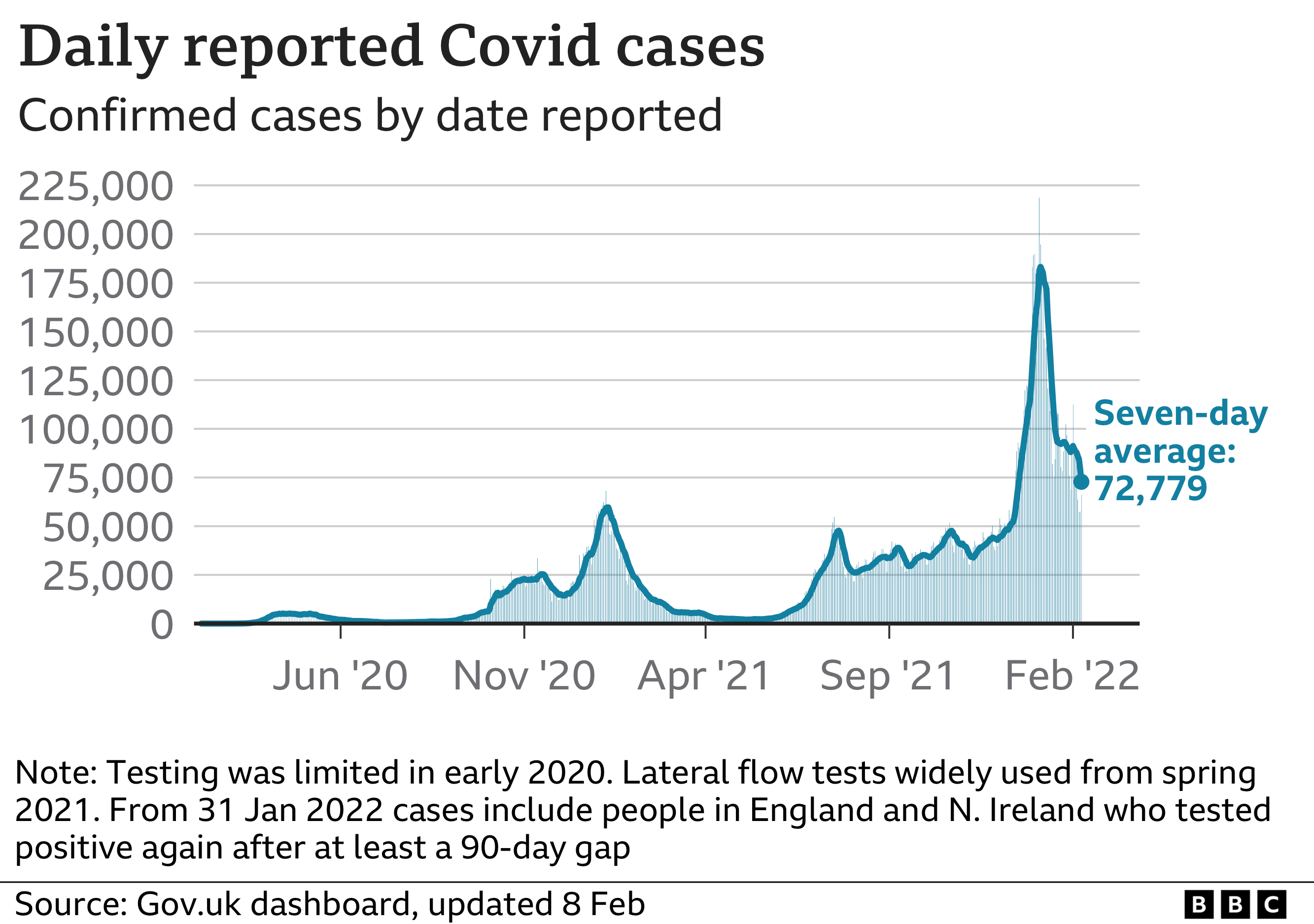BBC News 9 February 2022 - by Francesca Gillett
All remaining Covid restrictions in England - including the legal rule to self-isolate - could end later this month, Boris Johnson has said.
Under the current rules, anyone who tests positive must self-isolate for at least five days.
The current restrictions are due to expire on 24 March.
He said he intended to return after parliamentary recess - which is from 21 February - to outline the government's strategy for living with Covid.
"It is my intention to return on the first day after the half-term recess to present our strategy for living with Covid," Mr Johnson said at the start of Prime Minister's Questions.
"Provided the current encouraging trends in the data continue, it is my expectation that we will be able to end the last domestic restrictions - including the legal requirement to self-isolate if you test positive - a full month early."
The law will be replaced with guidance, Downing Street said - and for example people will be urged not to go to work if they have Covid.
Back in January, Mr Johnson said the restrictions would end for good when they expired in March - and hinted they could end sooner.
"The self-isolation regulations expire on 24 March, at which point I very much expect not to renew them," he said at the time. "Indeed were the data to allow, I would like to seek a vote in this House to bring that date forwards."
Rules for travellers coming to the UK are also being relaxed later this month.
From this Friday 11 February fully vaccinated people coming to the UK will not need to take any Covid tests. Travellers who are not fully vaccinated will no longer have to isolate but they will have to take tests.
But people going abroad will still need to follow the rules which apply at their destination - and many UK families are choosing to cancel their half-term holidays to Spain because children over 12 must be jabbed to enter.
Cases have been falling in the UK since the peak in early January.
Latest daily official figures for the UK on Tuesday showed another 66,183 people tested positive for Covid and a further 314 people had died. There are currently 13,793 people in hospital with Covid.
And about 85% of people over 12 have been vaccinated with at least two doses.
Ministers had always said the rule on self-isolation could end before the planned date of 24 March.
The trends are positive - hospital cases are continuing to fall and the huge wave of infections caused by Omicron has not pushed overall deaths above what would normally be seen in winter.
But this decision has still taken most by surprise - as infection levels are still high and it's unclear what this will do to the spread of the virus.
It is, though, worth bearing in mind that not every infected person was self-isolating anyway.
This winter, the testing system has only picking up half of all infections - at the peak it was missing around an estimated 200,000 cases a day.
What's more, about one in five of those who test positive do not fully adhere to the self-isolation requirements.
The move is also likely to pave the way for the dismantling of the community testing system, with many experts believing tests will soon only be used in settings such as care homes and hospitals - or to deal with major outbreaks.
England is fast approaching the point where it treats Covid like any other respiratory illness.
The rules on self-isolation differ across the four nations of the UK.
In England, Northern Ireland and Wales anyone who develops symptoms or tests positive for Covid via a PCR or lateral flow test (LFT) must immediately self-isolate.
People are able to leave quarantine after five full days if they have two negative LFT results, 24 hours apart.
In Scotland, people must self-isolate for at least seven days - as soon as symptoms appear or they test positive.
In other Covid news, Prof Paul Hunter has said the UK is "past the point" at which vaccinating young healthy children would do any good.
Children aged 12 and over in the UK are currently offered a jab but only vulnerable under-12s are eligible for one.
The UK's vaccine advisory body the Joint Committee on Vaccination and Immunisation is reviewing whether to offer all under-12s a jab.
But Prof Hunter from the University of East Anglia told BBC Radio 4's Today programme infection rates in children were "falling really quickly at the moment".
"So I think in many ways we're past the point where vaccines are actually going to make much difference... it's probably too late because most kids have already had Omicron."



